I’ve missed you this week
From writing two pieces every week for the last year to one, I felt a slight disconnect with you all. More on this at the end of today’s piece.
Lacking the quietness I needed these last few days, due to the neediness of my little dachshund that refuses me any time to sit quietly and put my mind to my words, and in fact, if I were to share with you that she is currently sat here on my desk, next to my laptop, pinning my right arm down with her barrel chest so I’m currently forced to type left-handed which I find quite difficult, you might, like me think it all quite ridiculous.
But here we are. My furry daughter.
I put to use this week some trim from a large Nordman fir tree that had sat proudly adorned with baubles on the drive outside the house, and now its duties for the year are fulfilled, I can make use of it.
I’ve sawn off several branches, resinous, rich with the oils of the fir and have scraped these of their needles, collecting the greenery in an old trug basket. A great pile of them that should last me a year if I’m lucky. The naked, sap-filled branches, stripped bare of the soft green foliage that tacks your fingers together with sweet stickum, are perfect for adding to a pile of woodchippings to form great plumes of aromatic smoke that will flavour and stain fish, vegetables, meats, oils and butter in our smoker. The needles will gently dry to be turned into a rough bright green powder that I can mix into salts and sugars for curing. A dehydrated pine dust that will enhance the flavour of almost anything.
Imagine the hint of resin against the blackened char on wood-roasted leeks, or a handful mixed into a salt crust pastry that might encase a celeriac pulled from the garden, baked in a fire till soft inside, peeled from the hard-cooked pastry shell. Or pine-smoked butter for adding to a chunk of grilled venison perhaps or cold smoked yoghurt for the wood-roasted leeks.
I bought a pair of fat local trout, caught quite close to us here last week. Black, beady eyes fixed and cold as I cut away the fillets from the bones, the scales still shone with iridescence in the daylight, a rush through the colour spectrum flashing green, blue, red and gold, then back into the silver and black markings of the tiny overlapping scales. I removed the rib bones and belly fat from the deep red fillets, teasing out the fine hair-like pin bones with tweezers. I cut small nooks into the skin to allow the curing mixture and smoke to penetrate the flesh. I love to smoke fish, and I’ve never shied away from lighting a fire on which to cook whatever the conditions. You’ll find me in the most atrocious weather in the outdoor kitchen, winter rain, sleet and wind often without light. Never one to miss an opportunity to make a fire and to cook with it, and with the addition of the pine curing mix to my larder and the damp ends of some tree branches for the slow smoulder, then all was foretold.
I ground down the fir needles with a good handful of coarse salt and one of white sugar, a little more sugar than salt if you please. The mixture took on the green from the pine. A little citrus zest and some milled black pepper to finish and the mix is complete. The fillets taken from the fish, trimmed of all bones, fins and belly fat are now gently rubbed on both sides with the curing mix. I lay them top to tail, encrusted in the fragrant green crust, wrapping them neatly in parchment for a quiet night in the fridge, as one might tuck oneself into bed at the end of the day. I’m careful as I wrap them, not wanting to damage the soft fillets. Placed on a tray and left alone to let the sugar and salt permeate the meat, the resin from the pine lending an authority to the process.
After a day and a night in the fridge, they are washed of the cure, by now a deep green brine that has melted away at the fish fillets, a green grainy liquid that is useful for nothing in particular. The trout are now rinsed and wiped dry with a tea towel to ensure the surface is bone dry. Once again back into the fridge, uncovered for the rest of the day or overnight to let a dry film form on the surface. The fish should be left like this for a while, allowing time for the veneer to develop. This layer is called the pellicle. It will give the smoke a chance to take hold, giving the fish an aromatic smoky brown outer, keeping the moisture inside, and also preventing the white proteins associated with fish cookery from rising to the surface, important during hot smoking as they look dreadful. We’ll not be too troubled here by those today though, as this is a cold smoking technique.
Venturing outside, the dark is already almost here, I split some oak kindling with the back of a small hatchet against the sharp metal edge of a splitter, breaking a small log into shards of splintered wood. These will burn to embers quickly, ensuring that the smoke chamber remains cool. I have a small pouch of applewood chippings, well seasoned but not too dry, and when the embers are only what’s left of a low orange glow I’ll add a little, one handful at a time to the cinders, letting the smoke rise in a plume before adding another, controlling the top and bottom vents to prevent a rush of air that might ignite everything in a great whoosh. I just want the chips to smoke gently, alive with the glow of the coal underneath, but one that quietly works its way through the small pile of wood chippings. I walk away for the time it takes me to make a cup of tea, watching from the window into the now dark terrace to watch the white smoke from the chimney vent spiral away into the dark. Now to place a branch or two of the fir tree on top, allow the smoke to build again, close the vents then lay the fillets onto the rack
I sometimes punch a hole with a roasting fork through the collar of the fish fillet, trying a loop of string and then hanging the fish from the chimney. Today I’ll lay the fillets to one side, on a grid and leave them for two hours or so, occasionally checking the thermometer to ensure there is no heat in the chamber.
Two hours pass by, I am busy with the preparation of bread this afternoon so am not tempted to go to steal a look. It is best when smoking, that things are left well alone. To open the chamber might cause a rush of air which might disperse the smoke entirely, or rekindle the fire. Either would irritate me manifestly. I have allowed for a good pile of fuel to ensure the slow smoulder through the late afternoon so must trust my judgement that there is enough to complete the task.
Anyhow.
Bread needs work to be a success and I can’t afford to mess this up for there are hungry mouths awaiting these loaves of butter-enriched cheese bread.
The time is close to remove the fish from its smoke.
I go to stand outside on the old stone terrace in the cold of the evening, next to the smoker, just to be near the smell of the woodsmoke. I like the winter air. Probably due to the last few decades spent in the heat of professional kitchens. I don’t wear a coat as I enjoy the cold air on my skin, so I go in my T-shirt and apron. I’ve mentioned previously that I have an ongoing OCD with neatly folded white T-shirts and plain blue aprons. This, I hasten to add has been ongoing for years, long before ‘The Bear’ was released on Disney.
Maybe he copied me?
I mean, Bragard jackets are fine, a luxury even, and I have a very neat pile of them for special occasions systematically folded, starched, brilliant white Egyptian cotton, corners and pleats matching throughout the stack. But then I also have two perfectly folded stacks of new white T’s. Two per day. Always.
It is cold, hovering around freezing as I drink a hot espresso, taking in the quietness of the dark grounds. Behind me is a large warm house, full of people, though in front, just acres of dark fields, lakes and woodlands. There are owls, and foxes if you listen, and a high-speed train far off in the distance hurtles between cities, the whine of the engines amplified by the quiet emptiness of the night out here tucked in between the hills. Far in the distance is an aerial mast, glowing red in the darkness, a warning for aircraft. That and the moon are the only points of light, shadows cast down through the old trees in various shades of inky black.
A great gust of smoke rises as I open the lid of the smoker. I shine a torch and lift out the fillets. They are barely warm to the touch, firm and sticky with the oily smoke. I take them out and let them rest a while, letting the smoke calm. If you were to eat them now they would be strong, harsh even. It is better to leave them to sit for a night in the fridge. The complexities of the flavours allowed to settle before I slice them very thinly.
They will be simply eaten with no frills. A halved lemon at most. Long thin slices cut lengthways from the fillets, twisted around a fork, or picked up with fingers.
Simple food.
Other matters
As I changed my publication schedule from the beginning of this year, it became clear to me this week that I missed writing the second newsletter for you. With that in mind, I shall endeavour to write ad hoc content, here and there, during the days between my new regular Sunday publications. This week I shall share with you a loaf of bread made with plenty of cheese. A fine loaf that will take no more than a few hours of your afternoon. Just in time for tea.
In addition, the first chapter of ‘A Story of a Year’ will be with you at the end of January. For those of you who are new here, if you were to look back in my archive to December 24th, you’ll see that I am about to begin serialising a journey through the twelve months of my year, one chapter a month, twelve in total. A small book, written on the fly, so to speak, that takes us through a calendar year of ingredients, foraging, seasonality, recipes, techniques, the countryside and my love of nature. This will not be a recipe book as such with lists and detailed instructions but something that is written in quiet prose.
Writing for an afternoon’s reading, free from interruption.
This will be for those with a paid subscription. If you’d like to upgrade then that’s easy for you and brilliant for me.
Until next week,
William





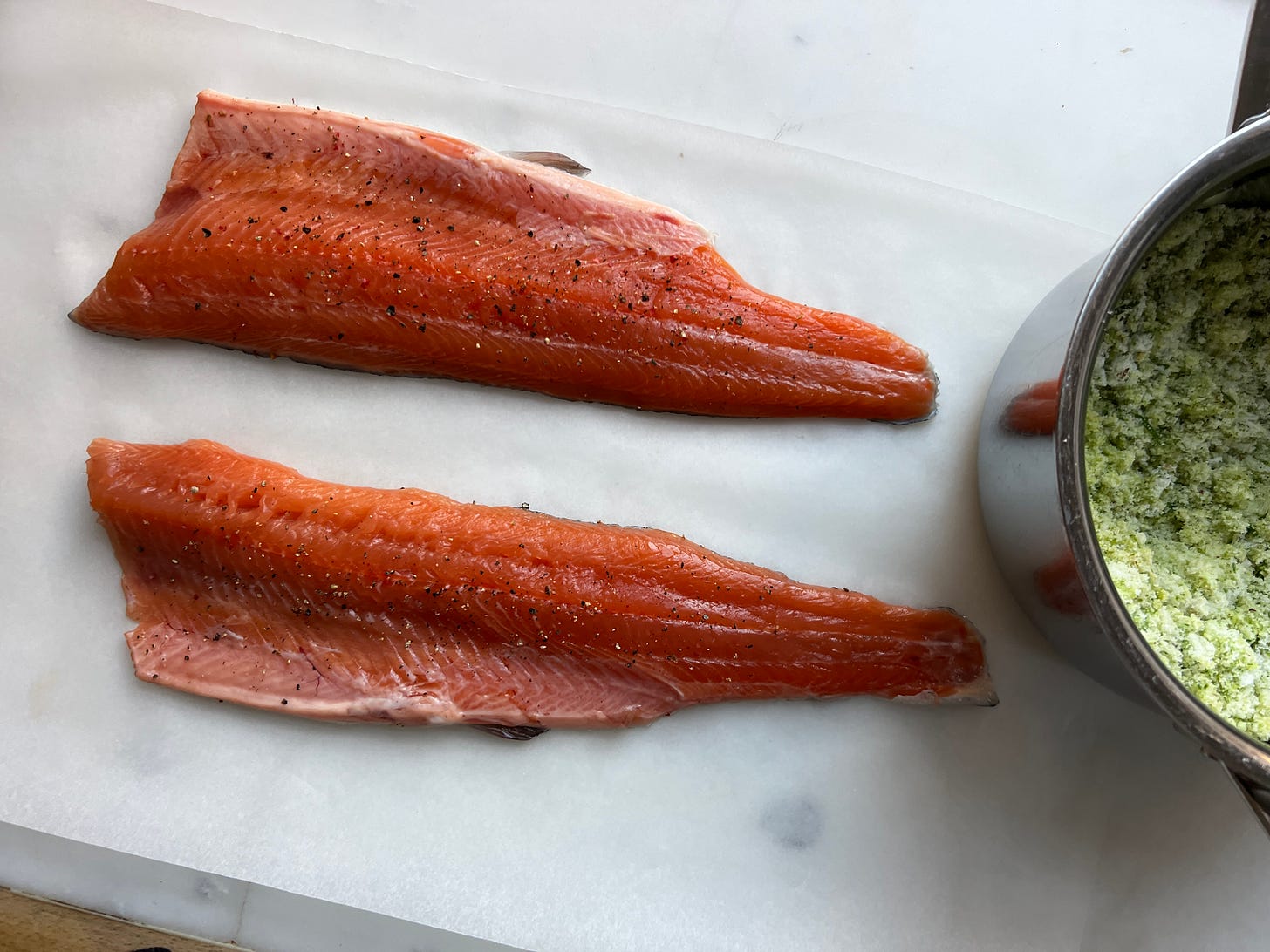
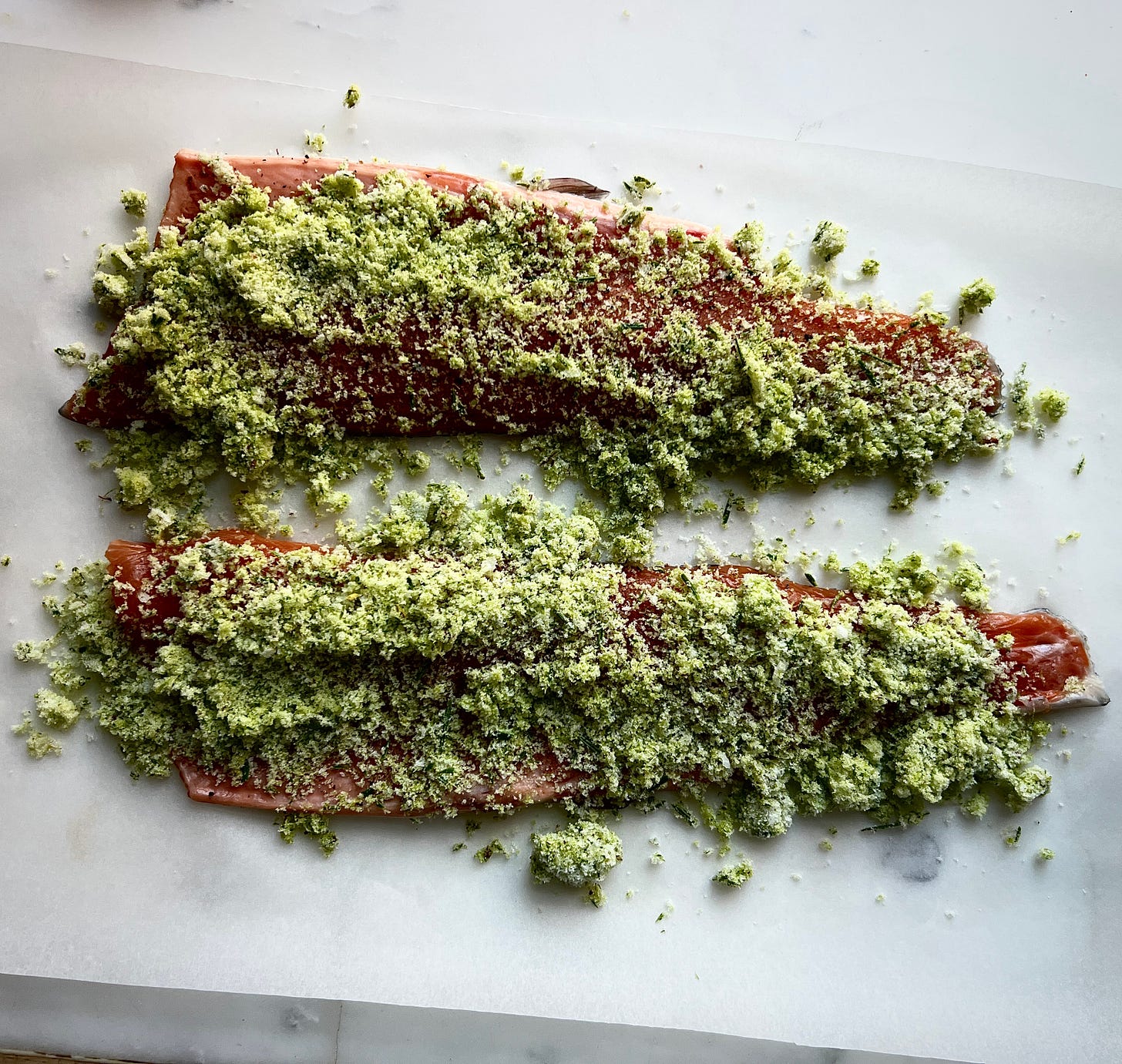
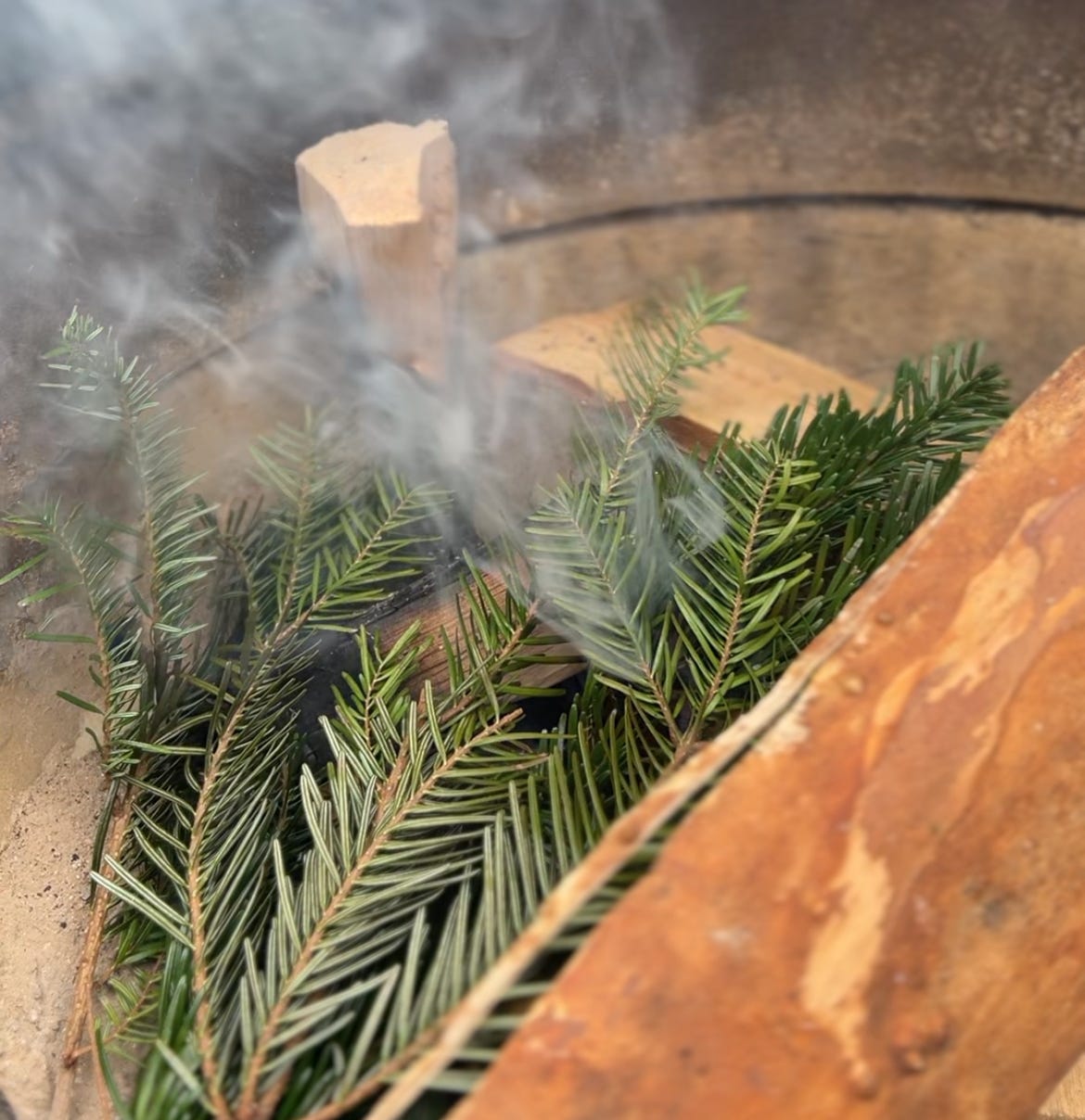
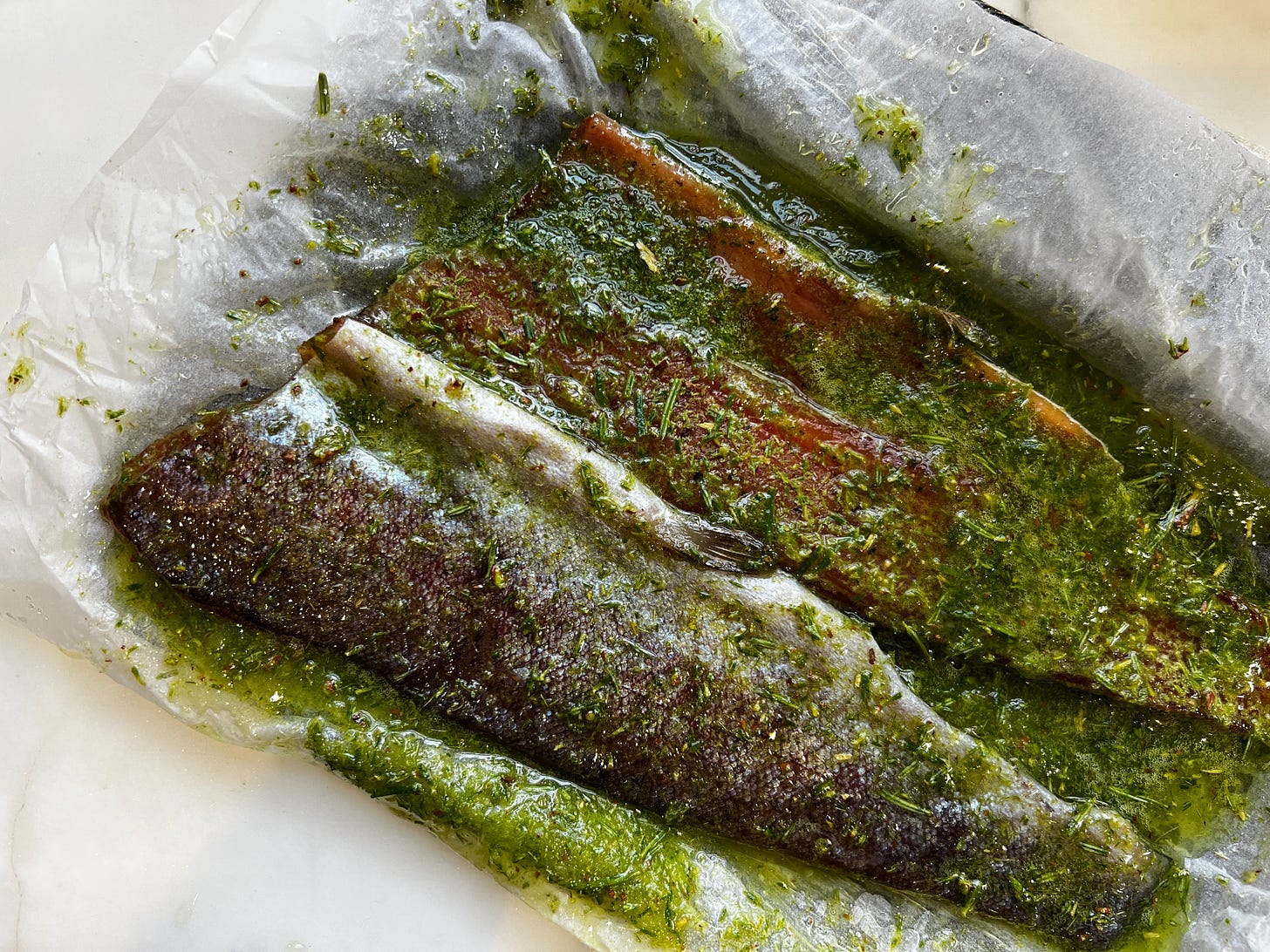
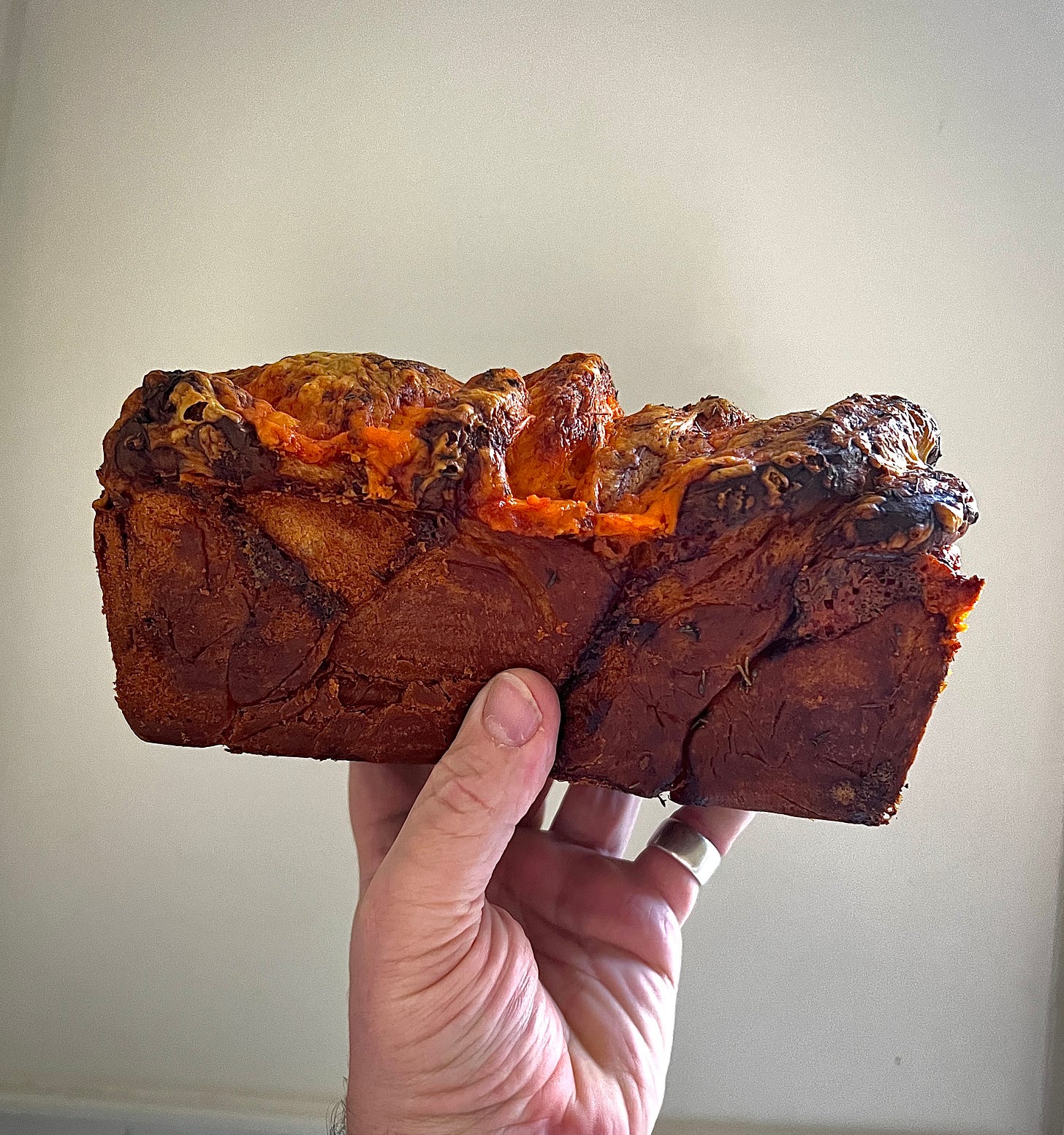
We’ve had a tough week here on the coast of Maine with a lot of damage caused by high winds and tides. But your essay about cold smoked trout today is a beautiful and timely escape. Thank you Will and Truffle (your self-appointed helper).
As always, your meticulous technique vies for attention with your stunning prose.
We've missed you, as well.